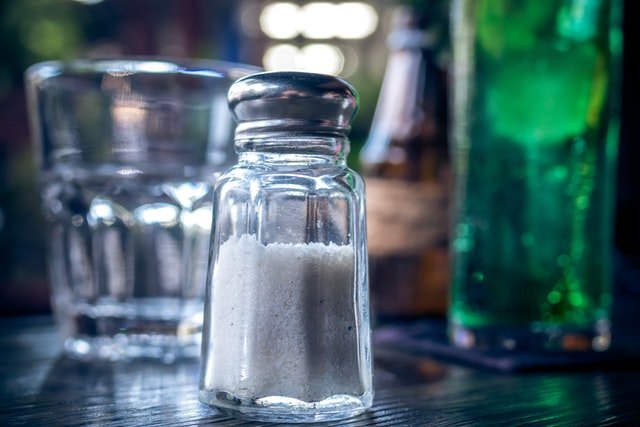
More surprising findings have been reported by researchers at Georgia State, who discovered new information about the relationship between brain activity and blood flow in the brain, as well as how the brain reacts to salt intake.
When neurons are activated, blood flow to the region generally rises rapidly.
This condition is known as neurovascular coupling or functional hyperemia, and it has been observed blood flow changes in the brain linked to specific types of stimulation or mental tasks.
However, little is known about how other aspects of lifestyle factor into this process.
How does salt affect blood flow in the brain?
Researchers assessed healthy participants who were either fed a diet high in sodium for one week or placed on a restricted low-salt diet.
Studies using functional magnetic resonance imaging (fMRI) were conducted on both groups of participants at the beginning and end of each week.
During an fMRI, participants are asked to perform mental tasks while wearing a special type of scanner that measures blood flow changes in the brain.
The study found that participants on both diets showed brain activity in response to the fMRI tasks.
However, researchers also found that blood flow was significantly higher when participants were consuming a high-salt diet compared to when they were eating low salt.
This suggests that dietary salt has an impact on neurovascular coupling even among healthy participants with no known history of high blood pressure.
Even in people without high blood pressure, consuming a lot of salt may elicit changes in the brain that last for several hours. This research suggests that salt intake may affect how the brain responds to stimuli.
Dr. Denis A. Evans, senior author and director of the Laboratory for the Study of Hypertension and Cerebrovascular Disease at Georgia State University
Does salt affect mental health?
The findings may also have implications for mental health.
The brains of patients with psychiatric diseases show altered responses to tasks that use the frontal-temporal network, which includes regions linked to language and communication, memory, attention, and reasoning.
“This research suggests that high salt intake could affect not only early cardiovascular disease but also neuropsychiatric conditions,” Dr. Evans said.
How does salt affect blood pressure?
Salt is known to have an effect on blood pressure, and it’s well established that high blood pressure can lead to cardiovascular diseases like stroke and heart attack.
However, the new study sheds light on how sodium intake may impact the brain and mental health.
“We provided new evidence that salt intake may influence the activity of regions of the brain that are important for attention, reasoning and higher-order executive function,” Dr. Evans said.
“The results present a strong argument that incorporating this information into our daily diet may have an impact on how we think and perform in everyday life.”
Does salt affect memory?
One aspect that has not been studied is whether blood flow in the brain is linked to memory. It’s possible that a higher intake of dietary salt may influence neurovascular coupling, which could have an effect on short and long-term memory and make you hard to maintain your brain health.
“If we want to understand how diet influences our cognitive function and mental health, then it’s critical to understand how the food we eat interacts with the functioning of the brain,” Dr. Evans said. “This study suggests that high-salt diets may have an impact on the brain regions controlling attention and reasoning, as well as affecting blood pressure.”
Can salt lead to depression?
Another question that remains unanswered is whether dietary salt intake also has an effect on mental health.
High-salt diets have been linked to increased rates of depression, but the connection between sodium consumption and neuropsychiatric disorders remains unclear. “This study presents interesting new evidence for how dietary salt may affect cognitive function and mood,” Turer said.
Is it possible to reduce the impact of high salt consumption on mental health?
“There are many things you can do to reduce your risk for hypertension, including leading a healthy lifestyle, exercising and eating a healthy diet,” Evans said.
“An area that has not been well-studied is whether dietary changes to reduce salt intake have a direct impact on the way our brains function.”
It is possible that a diet lower in sodium could reduce hypertension and have beneficial effects on brain activity and blood flow.
“This research suggests that reducing dietary salt may have an effect on higher-order executive function, which refers to the ability to plan and solve problems,” Evans said.
“We may need to pay more attention to how much salt we eat and make sure our intake isn’t excessive.”
What should we do?
“The study adds to our understanding of why too much salt isn’t good for you. This will not come as a surprise to most people, but sometimes data like this makes things real,” said Dr. Michael A. Turer, associate professor of clinical neurology and medical director of the Neuromuscular Disorders Center at Wake Forest School of Medicine.
“In addition to controlling hypertension, cutting down on salt could have a direct benefit in terms of mental acuity.”
However, this study provides evidence that salt intake has a direct effect on brain activity and blood flow in healthy individuals.
Additional studies are needed to determine if high salt consumption could also affect the brains of people with hypertension or other conditions.
“The next step is to figure out what this means for people at risk of high blood pressure,” Evans said.
Summary
A new study suggests that dietary salt intake could have an effect on attention, reasoning and higher-order executive function.
The results may present a strong argument that reducing sodium intake can impact how we think and perform in everyday life.
Salt is vital for normal body functioning, but most of us eat too much of it. This new research adds to the body of evidence that suggests the consumption of too much salt is associated with an increased risk of hypertension.
A new study provides evidence that dietary salt intake could have an effect on attention, reasoning and higher-order executive function.
The results may present a strong argument that reducing sodium intake can impact how we think and perform in everyday life.



